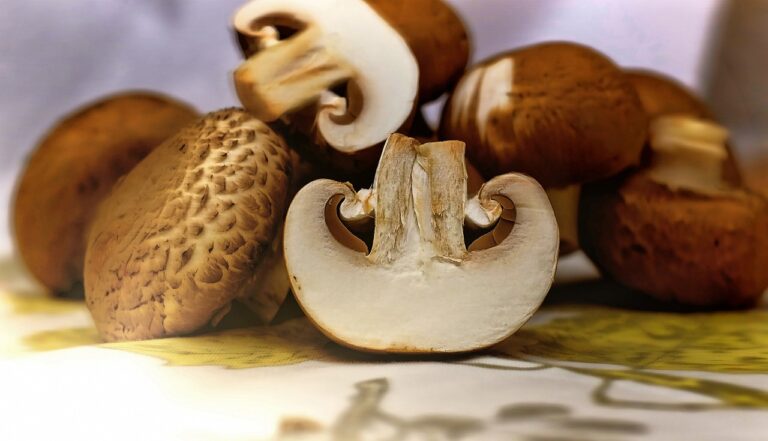Shrooms: The Little Umbrellas to Good Health

Having a rainbow of colors on your food plate is common health advice, but take a moment to embrace the humble white mushrooms. Those white bell-shaped fungi peeking out of your salad or pizza are indeed nutrient dense powerhouses that provide a variety of health benefits.
There is a long history of mushrooms being used in traditional medicine for their healing and cleansing properties. One edible mushroom variety, Agaricus blazei Murill, has traditionally been used to treat various diseases, including diabetes, chronic hepatitis, and cancer. Several research studies confirm that the increased use of this mushroom and many other edible species can promote anti-carcinogenic, anti-inflammatory, and anti-hypertensive effects. Although they may lack the green and red hues that many other nutrient rich foods contain, don’t be fooled by their humble white tone as mushrooms are not a white food to be avoided.
One cup serving of mushrooms contains only about 20 calories, is low in fat, and cholesterol-free. Mushrooms are also rich sources of essential vitamins and minerals. For example, shrooms contain potassium which helps regulate blood pressure. It also contains a significant number of B vitamins, such as folate, that improves memory and protects from cognitive decline. In short: these caped veggies are nothing short of nutritional wonders.
We often experience a “gut feeling” and make decisions simply by “trusting our gut instinct”. This relation between the mind and gut is not just metaphorical. In fact, it has been proven that our gut is our ‘second brain’ controlling digestion, mood, and even the way we think. Particularly, the millions of microbes that inhabit the gut influence our perception and can alter our behavior. The carbohydrate profile of mushrooms makes them a great prebiotic that acts as a food source for the tiny microbes lining our gut. Studies show that mushrooms contain polysaccharides that stimulate the growth of beneficial microbial strains like Lactobacillus and Bifidobacterium. When friendly bacteria is predominant, you are equipped with an internal army to support a healthy gut. So don’t think twice to integrate these delicious gut boosting powerhouses into your diet regimen.
Mushrooms are also good for your brain health. Who knew that those hidden pizza toppings could have a dramatic impact on brain cells? New research has found that a higher mushroom intake can have a protective effect on the brain and prevent risk of developing mild cognitive impairment that causes problems with learning and memory, and eventually may lead to Alzheimer’s disease. One variety of mushrooms, called Lion’s Mane, is particularly effective in stimulating the growth of proteins that nourish brain cells that enhance creativity, motivation, and brain function. Mushrooms are also the richest dietary source of an antioxidant called ergothioneine, or ERGO, that may prevent the growth of amyloid proteins related to dementia. Dementia is one of the top ten causes of death, but taking action and including the humble mushrooms in your diet can significantly reduce the risk and strengthen overall brain health. In fact, a research study conducted by the National University of Singapore found that mushroom eaters who ate more than two servings of mushrooms per week performed better in brain tests with a faster recall speed. The direct link between mushrooms and brain health is continuing to be researched.
Mushrooms have also been revered for their sleep boosting abilities. One variety of mushrooms, Reishi, is referred to as the “king of mushrooms” that facilitates a deep and restful sleep while also improving memory and concentration. Sleep restores and rejuvenates our minds. It is during sleep when our body enters its rest and repair mode, improving memory recall, and reducing mental fatigue.
Aside from the hidden nutritional benefits, mushrooms are also versatile. They can be added to a variety of dishes. Keep in mind that mushrooms are delicate and should be washed gently. Avoid cooking them in high-temperature as that can kill some of its essential nutrients. Here are some simple ways to add mushrooms to meals.
- Mix chopped mushrooms into your omelet or scrambled eggs.
- Add some mushrooms to your pasta sauce or soup.
- Bake portobello mushrooms stuffed with some cheese, garlic, and spinach and a sprinkle of olive oil.
- Enjoy mushrooms in a freshly baked homemade pizza.
A much-loved ingredient in many cuisines around the world, mushrooms are little umbrellas to good health packed with a nutritional punch of healthy goodness.
